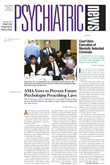APA’s efforts at increasing the influence of psychiatry in the AMA paid off in June with victories at the organization’s annual meeting in Chicago.
One key win will bring about more support from the AMA to address threats of new legislation expanding the scope of practice for non-M.Ds.
APA and the American Academy of Child and Adolescent Psychiatry (AACAP) introduced a resolution calling on the AMA to investigate the facts leading to the passage of HB 170, the law granting prescribing authority to psychologists in New Mexico (Psychiatric News, April 5).
The resolution also called for the AMA to develop a mechanism to resolve any future policy and/or strategic differences among the specialty societies and state and county medical associations represented within the AMA’s House of Delegates. This provision was a response to the fact that the New Mexico Medical Society (NMMS) had not opposed HB 170, despite the legislation’s conflict with AMA policy and the wishes of its members as indicated by an online survey.
When it appeared that the original resolution might be sidetracked by concerns about the ability of state medical societies to set their own legislative agendas, delegate John McIntyre, M.D., a former APA president, met with the NMMS delegation to develop a substitute resolution that ultimately received the support of that delegation, the appropriate AMA reference committee, and the House of Delegates.
McIntyre testified before the reference committee on legislation that granting prescribing privileges to psychologists would “undermine the fabric of medical education.” Louis Kraus, M.D., the alternate delegate from AACAP, spoke about the complexities of prescribing for children, saying, “The concept that psychologists would be able to treat children safely is unfathomable.”
Among other provisions, the final resolution calls for the AMA to work with specialty societies to monitor the status of initiatives that would permit prescribing by psychologists or other other non-M.D.s and for the AMA to work at the invitation of component societies to develop strategies concerning the expansion of scope of practice. Also, the AMA agreed to increase its staff support directed to scope of practice issues.
James Scully, M.D., chair of the Section Council on Psychiatry and the senior delegate, said, “Dr. McIntyre did a brilliant job in creating a joint resolution with the New Mexico delegation. We received overwhelming support concerning scope of practice from other state and specialty societies.”
Scully is the Alexander G. Donald Professor and chair of the department of neuropsychiatry and behavioral science at the University of South Carolina School of Medicine.
The Section Council on Psychiatry is composed of the delegates and alternate delegates of APA and AACAP, along with invited representatives of allied psychiatric organizations.
Protection of Patient Privacy
Four proposed resolutions addressed implementation of the Health Insurance Portability and Accountability Act (HIPAA). One of them called on the AMA to “pursue appropriate legislative and/or legal relief to prevent implementation of the HIPAA privacy rule,” if satisfactory modification to the rule were not obtained.
After several delegates had testified before the reference committee on legislation that the AMA should fight for the abolition of HIPAA or just the privacy rule, APA President Paul Appelbaum, M.D., reminded the committee of the important role physicians play in protecting the privacy of their patients. He urged the AMA to distinguish between important privacy protections and time-consuming regulations that could be eliminated without harm to patients.
Appelbaum advised the group that immediate past APA President Richard Harding, M.D., and he had met with White House staff concerning privacy regulations and found the staff to be receptive to modifications.
“The tenor of the testimony shifted and became more moderate after Dr. Appelbaum’s well-reasoned arguments,” said Scully in an interview after the AMA meeting. The committee began its report by commenting on “persuasive testimony that our AMA should retain its longstanding and extensive policy on patient privacy protections. . . .Our AMA cannot now be seen as opposing patient privacy.”
The House of Delegates adopted a resolution that encourages the modification of HIPAA’s privacy rule to remove burdensome regulations, registers opposition to the creation of a unique patient identification number, and directs the AMA to work with interested parties to find ways of offsetting HIPAA’s costs and to ensure that inadvertent disclosures of protected health information do not lead to the imposition of criminal sanctions.
Restructuring of AMA
The House of Delegates took an important step in its effort to respond to the problems of declining AMA membership and revenues.
The AMA lost more than 12,000 members in 2001, now representing 29 percent of U.S. physicians and medical students. That figure reflects a decline from 75 percent representation 30 years ago, according to an article in the April 27 National Journal.
Scully commented, “Physicians increasingly are diverting their energies from the AMA to specialty societies.”
The AMA has addressed that change with a series of studies and reports focusing on restructuring. Most recently, the Special Advisory Group Extraordinaire (SAGE), a group of 30 physicians and medical society staff leaders appointed by the AMA Board of Trustees, produced a series of recommendations after meetings throughout 2001.
The House of Delegates voted that a Committee on Organization of Organizations (COO) be established that would include state medical and national medical specialty societies to develop a business plan for the transition of the AMA to an organization of organizations.
The business plan is to include a cost analysis, provide an analysis of membership issues, and determine the services that should be provided by a more focused AMA. The plan is to be presented to the House of Delegates next June.
“The AMA has made a decision to move forward,” Scully said. “Now we must focus on the details of implementation to ensure that specialty societies will have a much greater role in AMA.”
Other Actions
These are among other actions taken by the House of Delegates at its June meeting:
• The House of Delegates adopted a report from the Council on Scientific Affairs (CSA) that includes recommendations for the AMA to work with members, parents, schools, and agencies to reduce the intimidation, violence, and aggression associated with bullying (see next issue of Psychiatric News). Former APA deputy medical director Carolyn Robinowitz, M.D., helped develop the report as a CSA member and was quoted by the Associated Press as saying that at least 10 percent of U.S. children have either been victimized or are bullies themselves, and many more are indirectly affected by observing the behavior in others.
• The House of Delegates voted to reaffirm AMA policy that the organization opposes and will work to eliminate mental health and chemical dependency carveouts and to recommend that the AMA develop and promulgate model state legislation to prohibit such carveouts. Kenneth M. Certa, M.D., an alternate delegate to the Section Council on Psychiatry, spoke about the negative impact of those carveouts on emergency rooms. Patients needing a bed in a psychiatric unit often must wait for extended periods in the emergency room before approval from a behavioral health carveout, he said.
• The House of Delegates adopted a new policy on resident physician work hours. According to the policy, total resident duty work hours may not exceed 80 hours per week, averaged over a two-week period; scheduled on-call assignments should not exceed 24 hours; on-call should not be more frequent than every third night; and there must be at least one consecutive 24-hour, duty-free period every seven days, averaged over two weeks. Scully spoke in support of the policy.
• Jo-Ellyn Ryall, M.D., a member of the APA Assembly, was re-elected to the AMA Council on Constitution and Bylaws. Alternate delegate Patrice Harris, M.D., who is also one of APA’s trustees-at-large, was elected to the Governing Council of the Women Physicians’ Congress. Delegate Rodrigo Muñoz, M.D., past APA president, was elected to the Governing Council of the Minority Affairs Consortium.
• AMA Trustee Ronald Davis, M.D., spoke to the Specialty and Service Society (SSS) about his visit to the APA Assembly during APA’s 2002 annual meeting in Philadelphia in May. He applauded the excellent work that APA is doing and the effectiveness of its governance. APA Assembly Speaker Albert Gaw, M.D., a guest at the meeting, thanked Davis and encouraged him to attend the next APA annual meeting.
More information about the AMA and its annual meeting is posted on the AMA Web site at www.ama-assn.org/ama/pub/category/7708.html. ▪

